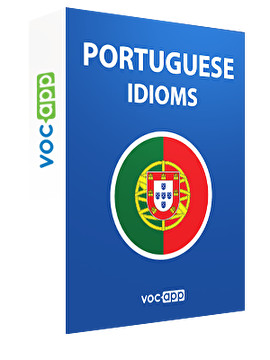


Portuguese idioms
Let your Portuguese shine through
 | 300 expressões idiomáticas em português 1-25 25 flashcards |  | 300 expressões idiomáticas em português 26-50 25 flashcards |  | 300 expressões idiomáticas em português 51-75 25 flashcards |
 | 300 expressões idiomáticas em português 76-100 25 flashcards |  | 300 expressões idiomáticas em português 101-125 25 flashcards |  | 300 expressões idiomáticas em português 126-150 24 flashcards |
 | 300 expressões idiomáticas em português 151-175 25 flashcards |  | 300 expressões idiomáticas em português 176-200 25 flashcards | Show all lessons (12) | |
If you are not satisfied with the product you have bought, contact us and we will reimburse your money.
Marcin Młodzki, board member(Warsaw, 1st Oct 2018)
VocApp Sp. z o.o.
ul. Mielczarskiego 8/58 | 02-798 Warszawa
TAX NUMBER: PL 951 245 79 19
Address
VocApp Sp. z o.o.ul. Mielczarskiego 8/58
02-798 Warszawa
NIP: 951 245 79 19
REGON: 369727696
Expressions used in Portugal and BrazilPortuguese idiomsTop 200 Portuguese regionalisms
Why learn Portuguese?
Approximately 208 million native speakers speak Portuguese, which makes Portuguese one of the most widely spoken languages in the world. The Portuguese language is present as an official language on several continents. In Europe it is spoken in Portugal while in South America it is present in Brazil. In Asia it is present in Macao and East Timor. On the continent of Africa there are more countries, with Portuguese spoken like Angola, Cape Verde, Guinea Bissau, Sao Tome and Principe and Equatorial Guinea. Learn to speak Portuguese promotes greater ease in learning other Romance languages like Spanish, Italian or French, since they are languages derived from Latin and have similar vocabulary and grammatical rules. Speaking Portuguese helps to deepen the knowledge of Latin culture by promoting a deeper understanding of its culture and history. You can read works in the native language of the Brazilian writer Paulo Coelho responsible for one of the best selling books in the world "The Alchemist" or the Nobel Prize for Literature José Saramago.
What are idiomatic expressions?
The idioms are used by the native speakers of a given language having as main characteristic the use figurative but not literal. Its literal translation does not make sense in another language, so it is difficult or sometimes impossible to translate idiomatic expressions into other languages. All languages have idioms, sometimes being associated with cultural contexts or slang.
Portuguese idioms
Speak like a native Portuguese and learn the idioms most often used. In this course, we have selected the 300 most used idioms . With our repeating system, it will be easier to memorize portuguese idioms. In this course, we explain the meaning of each idiom using everyday examples. This course is an added value to broaden your vocabulary and better understand the Portuguese culture. Idioms, as a general rule have an associated history, which most often reflects the history and culture of a particular city or country.
Improve your vocabulary with our courses:



